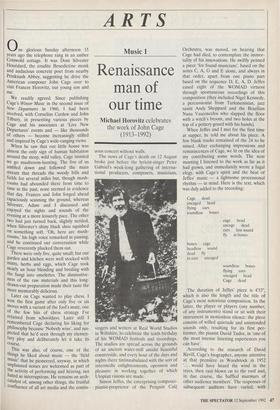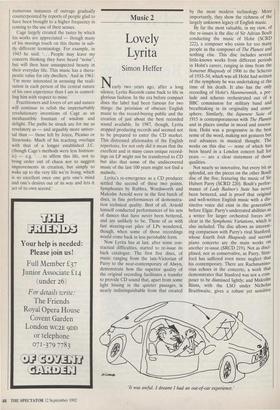ARTS
Music 1
Renaissance man of our time
Michael Horovitz celebrates the work of John Cage
(1913-1992)
0 ne glorious Sunday afternoon 15 years ago the telephone rang in an amber Cotswold cottage. It was Dom Silvester Houedard, the erudite Benedictine monk and audacious concrete poet from nearby Prinknash Abbey, suggesting he drive the American composer John Cage over to visit Frances Horovitz, our young son and me.
We readily agreed. Since publishing Cage's Winter Music in the second issue of New Departures in 1960, I had been involved, with Cornelius Cardew and John Tilbury, in presenting various pieces by Cage and his associates at 'Live New Departures' events and — like thousands of others — become increasingly stilled and inspired by Cage's wide-ranging views.
When he saw that our little house was almost the only sign of human habitation around the steep, wild valley, Cage insisted We go mushroom-hunting. The five of us ambled down and followed the main stream that threads the woody hills and fields for several miles but, though mush- rooms had abounded there from time to time in the past, none seemed in evidence that day. Frances and John forged ahead rapaciously scanning the ground, whereas Silvester, Adam and I discussed and enjoyed the sights and sounds of the evening at a more leisurely pace. The other two had just turned back, slightly nettled, When Silvester's shiny black shoe squished on something soft. 'Oh, here are mush- rooms,' his high voice remarked in passing, and he continued our conversation while Cage reverently plucked them out. There were only five, quite small; but our garden and kitchen were well stocked with mints, herbs and eggs, which Cage took nearly an hour blending and broiling with the fungi into omelettes. The diminutive- ness of the raw materials and this long- drawn-out preparation made their taste the more memorably delicious.
Later on Cage wanted to play chess. I won the first game after only five or six moves with a variant of the fool's mate, one of the few bits of chess strategy I've retained from schooldays. Later still I remembered Cage declaring his liking for Philosophy because 'Nobody wins', and sus- Pected that he'd seen through my elemen- tary ploy and deliberately let it take its course.
This was also, of course, one of the things he liked about music — the 'field music' that he pioneered, anyway, in which unplanned noises are welcomed as part of the activity of performing and hearing, not hated as interruptions. He remains an arch- Catalyst of, among other things, the fruitful confluence of all art media and the contin-
uous concert without walls.
The news of Cage's death on 12 August broke just before the lyricist-singer Peter Gabriel's week-long gathering of interna- tional producers, composers, musicians, singers and writers at Real World Studios in Wiltshire, to celebrate the tenth birthday of his WOMAD festivals and recordings. The studios are spread across the grounds of an ancient water-mill amidst beautiful countryside, and every hour of the days and nights there tintinnabulated with the sort of intermedic enlightenments, openness and pleasure in working together of which Utopian visions are made.
Simon Jeffes, the enterprising composer- pianist-proprietor of the Penguin Café Orchestra, was moved, on hearing that Cage had died, to contemplate the immor- tality of his innovations. He swiftly penned a piece 'for found musicians', based on the notes C, A, G and E alone, and always in that order, apart from one piano part based on the sequence D, E, A, D. Jeffes eased eight of the WOMAD virtuosi through spontaneous recordings of this composition (they included Nigel Kennedy, a percussionist from Turkmenistan, jazz saxist Andy Sheppard and the Brazilian Nana Vasconcelos who slapped the floor with a witch's broom, and two holes at the top of a pottery gourd with his hands).
When Jeffes and I met for the first time at supper, he told me about his piece. A few blank tracks remained of the 24 to be mixed. After exchanging impressions and reminiscences of Cage, we lit on the idea of my contributing some words. The next morning I listened to the work as far as it had grown, and immediately wrote a fugal elegy, with Cage's spirit and the beat of Jeffes' music — a lightsome processional rhythm — in mind. Here is the text, which was duly added to the recording:
Cage dead uncaged head flying ears soundless bones cage head uncage dead ears less sound fly in bones bones cage headless sound dead fly in ears uncaged soundless bones flying ears uncaged head Cage dead
The duration of Jeffes' piece is 433", which is also the length and the title of Cage's most notorious composition. In the latter, the player or players (any number, of any instruments) stand or sit with their instrument in motionless silence: the piece consists of willed quietude and unintended sounds only, resulting for its first per- former, the pianist David Tudor, in 'one of the most intense listening experiences you can have'.
According to the research of David Revill, Cage's biographer, anyone attentive at that premiere in Woodstock in 1952 would have heard the wind in the trees, then rain blown on to the roof and, in due course, the baffled murmurs of other audience members'. The responses of subsequent auditors have varied, with numerous instances of outrage gradually counterpointed by reports of people glad to have been brought to a higher frequency in coming to the use of their senses.
Cage largely created the tastes by which his works are appreciated — though many of his musings touch on this theme in sub- tly different terminology. For example, in 1943 he said: `. . . People may leave my concerts thinking they have heard "noise", but will then hear unsuspected beauty in their everyday life. This music has a thera- peutic value for city dwellers.' And in 1961: 'I'm more interested in arousing the reali- sation in each person of the central nature of his own experience than I am in control- ling him with respect to mine.'
Practitioners and lovers of art and nature will continue to relish the imperturbably revolutionary inventions of Cage as an inexhaustible fountain of wisdom and delight. The paths he struck are for me as revelatory as — and arguably more univer- sal than — those left by Joyce, Picasso or Stravinsky. Much of his teaching overlaps with that of a longer established J.C. (though Cage's methods were less histrion- ic) — e.g. `... to affirm this life, not to bring order out of chaos nor to suggest improvements in creation, but simply to wake up to the very life we're living, which is so excellent once one gets one's mind and one's desires out of its way and lets it act of its own accord.'



































































 Previous page
Previous page